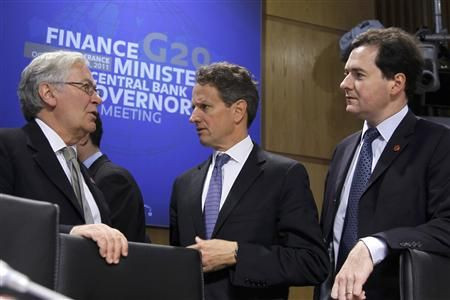G20 Meeting: U.S.’s Geithner Sees ‘Ray of Light’ in Plan to Stop Europe Debt Crisis

The chief public finance official of the world's largest economy said Sunday that he sees a ray of light in Europe's most recent effort to stop its sovereign debt crisis. U.S. Treasury Secretary Timothy Geithner, while attending a Group of Twenty (G20) meeting in Paris, said he is encouraged by the latest effort to address the crisis.
The elements of this plan include a much more substantial financial firewall to ensure that the governments of Europe can borrow at sustainable interest rates, Geithner said at a briefing after the G20 meeting in Paris on Sunday, Bloomberg News reported. It also includes a broad recapitalization of banks, further support for a sustainable program in Greece and steps toward fiscal union.
They clearly have more work to do on the strategy and the details, but when France and Germany agree on a plan together and decide to act, big things are possible, Geithner said, Reuters reported Sunday. I am encouraged by the speed and direction in which they are moving.
The euro has rallied in recent sessions against the dollar, on optimism that Europe, led by Germany and France, will implement an intervention plan that's finally large enough to get ahead of the curve in regard to Greece's ability to service its debt -- thus keeping the contagion in check. Contagion, among other consequences, can cause institutional investors to sell an excessive amount of Southern European bonds, on the concern that rising interest rates will trigger a Greek default, and possibly other European-nation defaults. On Sunday, the euro traded at $1.3871, down about one-tenth of a U.S. cent. However, the euro has strengthened about six U.S. cents against the dollar in the past 10 days, on talk of a substantive intervention package.
The G20 communique urged the Eurozone to maximize the impact of the EFSF [European Financial Stability Facility] in order to address contagion. European Union officials said the most likely option was to use the €440 billion or $611 billion fund to offer partial loss insurance to buyers of stressed member states' bonds, in a bid to stabilize the market.
Key Troika Report to Be Released Wednesday Night
The G20 leaders also told the Eurozone that by the European Summit next Sunday it should: agree on the amount of losses the private sector should take on in regard to Greek debt; arrange a credible plan for the recapitalization of Europe's banks; and install a firewall to protect other countries from Greece's woes, FT.com reported Sunday.
The aforementioned plan will give Germany and France less than a week to resolve their differences, FT.com reported. No substantive details of the stabilization package are expected before Thursday, when the 17 governments of the Eurozone will have the full financial/fiscal report from the troika -- the International Monetary Fund (IMF), the European Commission (EC) and the European Central Bank (ECB). The report is expected to be released Wednesday night.
In that report, Greece's fiscal gap is expected to be announced, as well as how much of a haircut, or debt reduction, bond holders will need to agree to; previously, bond holders agreed to a 21 percent reduction in debt.
Monetary/Economic Analysis: What institutional investors want to see is some mechanism that indicates that Greece will be able to service its debt -- without asking bond holders to sacrifice too much. Ideally, it would be a shared sacrifice plan -- one where the wealthier nations in the Eurozone, led by Germany and France, account for a portion of Greece's restructuring costs, along with bond holders.
European officials will also have to determine whether any write-down by bond holders will be voluntary, or required. Germany's Finance Minister Wolfgang Schauble said any package must contain a lasting solution to the Greek debt problem, with an increased contribution from private creditors, but France and the ECB say any Greek debt restructuring must be voluntary.
© Copyright IBTimes 2024. All rights reserved.





















